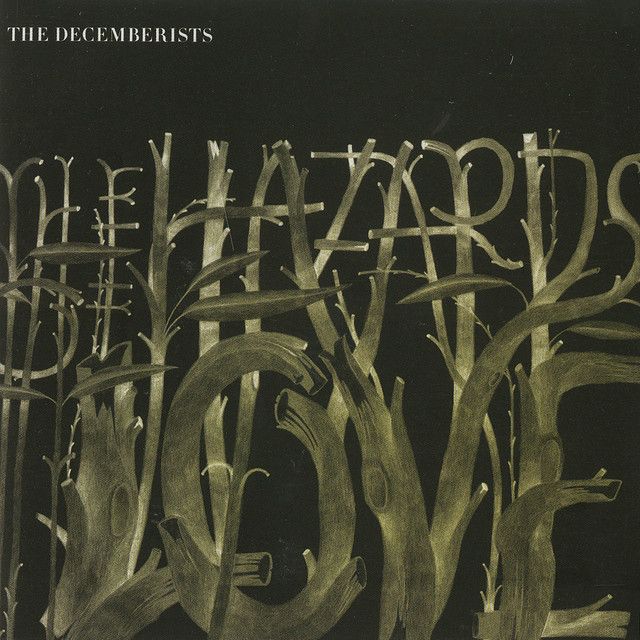It seems unfortunate to me that in reading about The Decemberists' latest opus, The Hazards of Love, so many people are unwilling to confront the elephant in the room, namely that Colin Meloy & Co. have created a concept album which is one continuous piece of music that tells the story of a shape-shifting male dryad type character who schtups and then falls in love with a woman. These people feel the need to point out supposed elements of irony or in some way deny the big fat concept album that bears more than a passing resemblance to progressive rock which sits before them. It's like creating a rock opera is an act of violence that needs some kind of post-modern artistic justification. I mean, what same person would write a fairy tale and set it to rock music, right?
The Hazards of Love started out as a musical in the ears of Colin Meloy but, for whatever reasons, it didn't come together. And so a new Decemberists album was born. Meloy sings the parts of William, half of our ill-fated couple, while Lavender Diamond's Becky Stark gives a tender, Sandy Denny-like voice to the other half, Margaret. Shara Worden of My Brightest Diamond plays William's mother, The Queen, with wicked aplomb. Meloy fills in the rest of the parts.
The storyline is something that would have made Robert Graves proud. William and Margaret turn the bucolic setting of the forest into their own private love nest. Alas, the lovers are beset by problems ranging from William's overbearing mother who seems more than a tad jealous to the infanticidal Rake who abducts Margaret. It may sound a bit twee, especially in light of Meloy's anachronistic logorrhea, but it's all part of the fun.
Approaching The Hazards of Love as a symphonic prog fan who is quite unfamiliar with the bulk of The Decemberists' back catalogue such as myself, it's easy to hear traces of the time when the likes of Genesis, Yes, and Jethro Tull were filling theatres and arenas. Jenny Conlee's opening "Prelude" not only introduces musical themes which will be recapitulated later but also allows the chance to give her Hammond B-3 organ, the workhorse of many prog bands, a workout. The first of four incarnations of the title track brings "Lover's Leap" by Genesis to mind with some nice upright bass work by Nate Query. And in grand prog tradition, the band just throw in everything including the kitchen sink. Pedal steel, hammered dulcimer, harpsichord, a chorus of children, string arrangements – they're all here.
Regardless of any proggy trappings, The Hazards of Love is still comprised of a series of wonderfully melodic rock songs carefully crafted with instrumental variety and dynamics. Acoustic guitars dominate but Chris Funk gets to turn up the amps a bit occasionally as in "Won't Want for Love". But even with the electric guitar and John Moen's plodding drums up in the mix, the acoustic 12-string is always somewhere in the background with some especially lovely picking during the chorus. The post-coital idyll "Isn't It a Lovely Night?" lilts along on a breeze of accordion and pedal steel. "Repaid" has some fuzzy riffing that could have been done by Chris Goss and Funk's slashing chords in "The Abduction of Margaret" demonstrate bombast at its best.
Conlee steps up in "The Hazards of Love 3 (Revenge!)" with her frenetic harpsichord and Hammond playing which would have sounded at home on just about any early 1970s Tull album. Listening to it, I expected the song to come to a screeching halt at any moment and to hear a phone ring. And when Meloy isn't doing verbal gymnastics with lines like "The prettiest whistles won't wrestle the thistle undone", he can be found gleefully bragging in the role of Rake describing the murder of his progeny or tenderly wallowing in the glow of affection as in "The Hazards of Love 2 (Wager All)".
The narrative here won't win any prizes for its clarity, but The Hazards of Love still hangs together due to great songs and great performances. Drama swells and tension is released over the course of almost an hour and I hear new things every time I listen – a bit of 12-string hear or some hi-hat work there. It's nice to hear an album that rewards repeated as well as sustained listenings for a change.

No comments:
Post a Comment